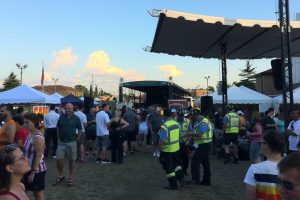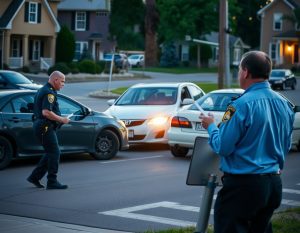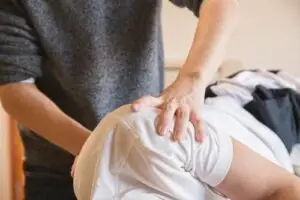
If you or someone you love has been injured at a public event, you might be wondering: Who’s responsible? What steps should I take? Is there a case worth pursuing? In this post, we’ll break down the legal landscape of injuries at public gatherings, from city-sponsored parades to large-scale concerts.
The Reality Behind the Fun
Let’s set the scene.
Imagine you’re at a summer food festival with your family. It’s bustling—live music, food trucks, kids playing, the whole nine yards. Then, out of nowhere, a loosely secured canopy collapses. People scream. You’re knocked down. You later discover you’ve suffered a fractured wrist and a mild concussion.
You weren’t doing anything wrong. You were just there to enjoy your Saturday.
Situations like this, unfortunately, are more common than most think. Whether it’s due to poor crowd control, faulty structures, slippery walkways, or even over-served guests getting aggressive, public events carry real risks. The question is—when those risks result in harm, what legal remedies exist?
Who Might Be Liable?
Liability in public event injury cases can be complex. It often involves multiple parties, overlapping responsibilities, and layers of insurance. But generally, here are the main players who could potentially be held responsible:
1. Event Organizers
This could be a private event company, a city agency, or a nonprofit. If the injury resulted from poor planning, lack of adequate security, failure to follow safety protocols, or negligence in setup, the organizers might bear the legal burden.
2. Venue Owners
If the event is hosted at a rented space—like a stadium, park, or community center—the property owner has a duty to maintain safe premises. Unsafe stairs, poor lighting, broken handrails—these are examples of premises liability.
3. Vendors and Contractors
Food stands, merchandise booths, equipment rental companies—they’re all responsible for keeping their setup safe for the public. If your injury stemmed from something like a hot oil spill from a vendor’s fryer or a tent collapse, that individual party might be liable.
4. Security Companies
If a hired security team fails to control a crowd or prevent an incident—like a trampling situation or a violent altercation—there could be a case for negligent security.
The tricky part is figuring out exactly who did what—and whether their actions (or lack thereof) were legally negligent.
What Counts as Negligence?
Negligence is a legal term that boils down to someone failing to take reasonable care, resulting in harm to another. At a public event, this might look like:
- Ignoring weather warnings and failing to secure tents
- Not having medical staff on-site
- Overcrowding beyond venue limits
- Failing to warn attendees about known hazards (like uneven ground)
- Providing insufficient lighting in parking areas
In Illinois, to prove negligence, four elements must be established:
- Duty of care – the responsible party owed you a reasonable level of safety.
- Breach of duty – they failed to uphold that responsibility.
- Causation – their failure directly caused your injury.
- Damages – you suffered actual harm (medical bills, lost wages, pain and suffering, etc.).
Steps to Take After an Injury
If you’ve been hurt at an event, the steps you take immediately afterward can make a difference—both for your health and any potential legal claim.
Seek Medical Attention
Even if you think it’s “just a bruise,” it’s important to be seen by a medical professional. Some injuries—like concussions or soft tissue damage—can take time to reveal their full extent.
Document Everything
Take photos of the scene. Get contact info from witnesses. If there’s an incident report to file with event staff or security, do so. These details can be crucial later.
Avoid Talking to Insurance Reps Alone
You might get a friendly call from an insurance adjuster asking for a “quick chat.” Don’t be fooled. Their job is to minimize payouts. Talk to a personal injury attorney first.
Consult an Attorney
A lawyer experienced in personal injury law can help you sort out who might be liable, deal with insurance companies, and fight to get you the compensation you deserve.
Common Injuries at Public Events
Public event injuries come in all shapes and severities. Some of the most common include:
- Trip-and-fall or slip-and-fall injuries
- Broken bones
- Burns from food or equipment
- Assault-related injuries due to inadequate security
- Injuries from stage or booth collapses
- Heatstroke or dehydration at poorly managed outdoor events
Some cases can be resolved through a straightforward insurance claim. Others require formal legal action. Either way, don’t assume your injury is “just part of the risk” of attending public events. The law says otherwise.
Real Talk: You Deserve Safety
Events and festivals are meant to uplift, entertain, and bring people together—not to cause harm or chaos. When that basic promise of safety is broken, you deserve to know your rights.
We’ve represented people just like you—parents injured at local fairs, concert-goers who got hurt when a barricade failed, workers burned during food prep at events. Every story is different, but one truth holds: people deserve accountability, and justice should be accessible—not complicated or intimidating.
Let’s Talk
If you’ve been injured at a public event in the Chicago area—or anywhere in Illinois—reach out. At Costa Ivone, we don’t believe in rushed advice or legal jargon. We’ll take the time to listen, explain your options in plain English, and fight for what’s fair.
We offer free consultations, and you don’t pay unless we win. Let’s work together to make sure your story leads to something better.
Call us at (708) 816-2621
Or click here to get started with a free case review
Relevant Internal Links:
- Personal Injury Lawyer Chicago
- Slip and Fall Lawyer Chicago
- Workers Compensation Lawyer Chicago
- Car Accident Attorney Chicago
- Dog Bite Attorney Chicago
- Medical Malpractice Lawyer Chicago
- Wrongful Death Attorney Chicago
- Areas We Serve



